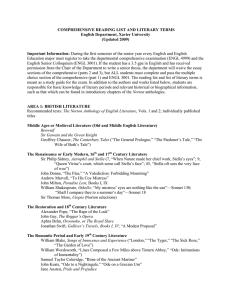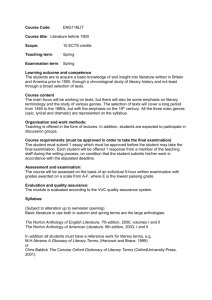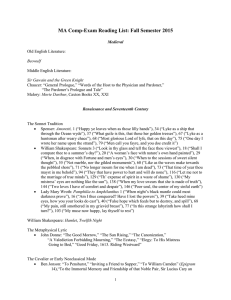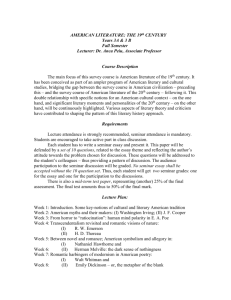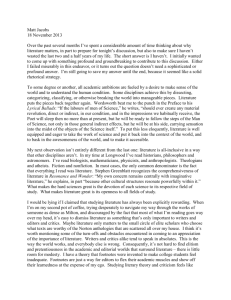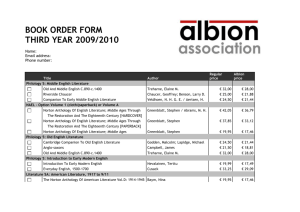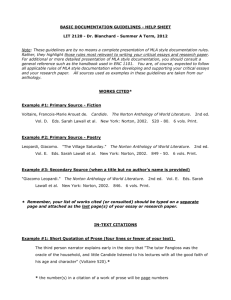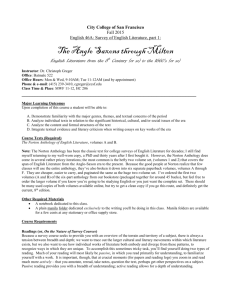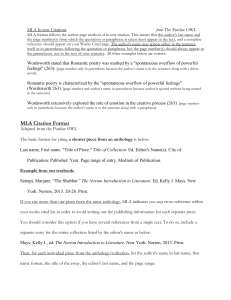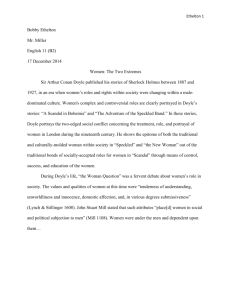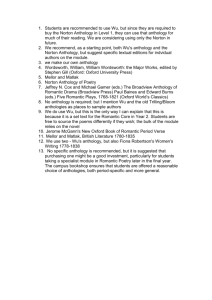Middle Ages - Xavier University of Louisiana
advertisement
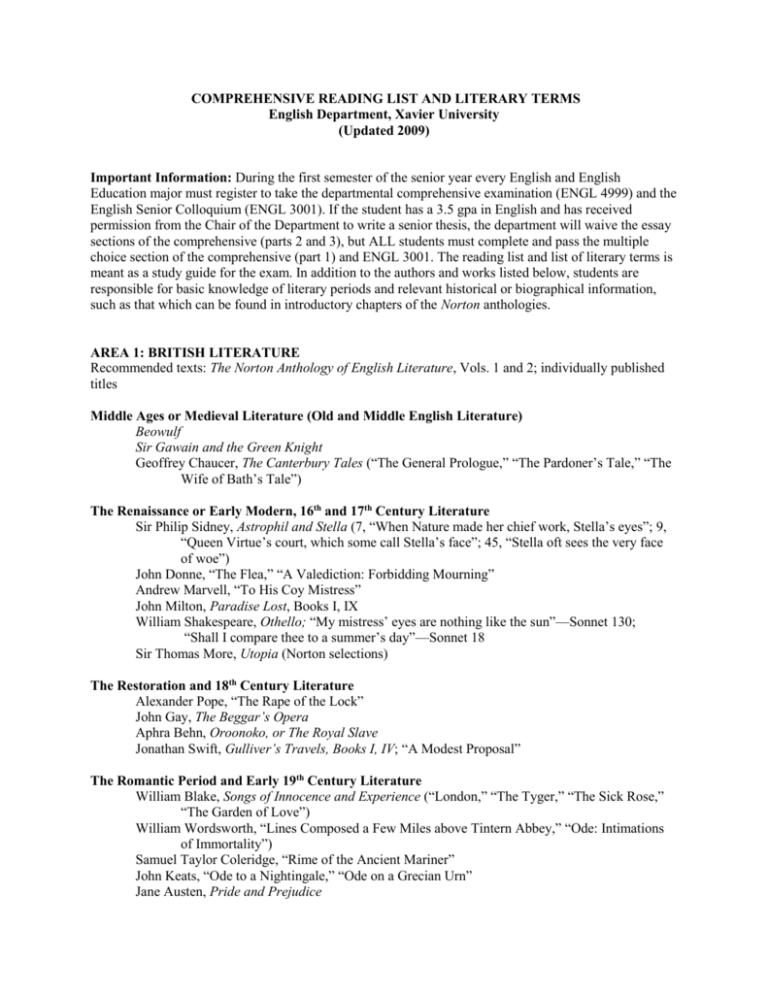
COMPREHENSIVE READING LIST AND LITERARY TERMS English Department, Xavier University (Updated 2009) Important Information: During the first semester of the senior year every English and English Education major must register to take the departmental comprehensive examination (ENGL 4999) and the English Senior Colloquium (ENGL 3001). If the student has a 3.5 gpa in English and has received permission from the Chair of the Department to write a senior thesis, the department will waive the essay sections of the comprehensive (parts 2 and 3), but ALL students must complete and pass the multiple choice section of the comprehensive (part 1) and ENGL 3001. The reading list and list of literary terms is meant as a study guide for the exam. In addition to the authors and works listed below, students are responsible for basic knowledge of literary periods and relevant historical or biographical information, such as that which can be found in introductory chapters of the Norton anthologies. AREA 1: BRITISH LITERATURE Recommended texts: The Norton Anthology of English Literature, Vols. 1 and 2; individually published titles Middle Ages or Medieval Literature (Old and Middle English Literature) Beowulf Sir Gawain and the Green Knight Geoffrey Chaucer, The Canterbury Tales (“The General Prologue,” “The Pardoner’s Tale,” “The Wife of Bath’s Tale”) The Renaissance or Early Modern, 16th and 17th Century Literature Sir Philip Sidney, Astrophil and Stella (7, “When Nature made her chief work, Stella’s eyes”; 9, “Queen Virtue’s court, which some call Stella’s face”; 45, “Stella oft sees the very face of woe”) John Donne, “The Flea,” “A Valediction: Forbidding Mourning” Andrew Marvell, “To His Coy Mistress” John Milton, Paradise Lost, Books I, IX William Shakespeare, Othello; “My mistress’ eyes are nothing like the sun”—Sonnet 130; “Shall I compare thee to a summer’s day”—Sonnet 18 Sir Thomas More, Utopia (Norton selections) The Restoration and 18th Century Literature Alexander Pope, “The Rape of the Lock” John Gay, The Beggar’s Opera Aphra Behn, Oroonoko, or The Royal Slave Jonathan Swift, Gulliver’s Travels, Books I, IV; “A Modest Proposal” The Romantic Period and Early 19th Century Literature William Blake, Songs of Innocence and Experience (“London,” “The Tyger,” “The Sick Rose,” “The Garden of Love”) William Wordsworth, “Lines Composed a Few Miles above Tintern Abbey,” “Ode: Intimations of Immortality”) Samuel Taylor Coleridge, “Rime of the Ancient Mariner” John Keats, “Ode to a Nightingale,” “Ode on a Grecian Urn” Jane Austen, Pride and Prejudice The Victorian Period Alfred, Lord Tennyson, “Ulysses” Robert Browning, “My Last Duchess” Matthew Arnold, “Dover Beach” Christina Rossetti, “Goblin Market” Oscar Wilde, The Importance of Being Earnest Charlotte Bronte, Jane Eyre The 20th Century (includes Modern and Postmodern Literature) Wilfred Owen “Dulce et Decorum Est” William Butler Yeats, “Sailing to Byzantium,” “Leda and the Swan,” “The Second Coming” W.H. Auden, “Musee des Beaux Arts” Dylan Thomas, “Do not go gentle into that good night” Joseph Conrad, Heart of Darkness Virginia Woolf, Mrs. Dalloway James Joyce “The Dead” Seamus Heaney, “Digging” Samuel Beckett, Waiting for Godot AREA 2: AMERICAN AND AFRICAN AMERICAN LITERATURE Recommended texts: The Norton Anthology of American Literature, Vols. A-E; The Norton Anthology of African American Literature, 2nd edition; individually published titles The Colonial and Revolutionary Periods Anne Bradstreet, “To My Dear and Loving Husband” Phillis Wheatley, “Thoughts on Imagination” Olaudah Equiano, from The Interesting Narrative of the Life of Olaudah Equiano, or Gustavus Vassa, the African (Ch. 1-3) The 19th Century to the Civil War Henry David Thoreau “Civil Disobedience” Edgar Allan Poe, “The Raven,” Frederick Douglass, Narrative of the Life of Frederick Douglass. Nathaniel Hawthorne, The Scarlet Letter Herman Melville, “Benito Cereno” Walt Whitman, “When Lilacs Last in the Dooryard Bloom’d” Emily Dickinson, “I Heard a Fly Buzz When I Died” The Late 19th Century after the Civil War Paul Laurence Dunbar, “We Wear the Mask” Mark Twain, Huckleberry Finn Charles Chesnutt, “The Wife of His Youth” Kate Chopin, The Awakening The 20th Century to World War II W. E. B. DuBois, The Souls of Black Folk, Foreword, Ch. 1, Ch. 14 Robert Frost, “Birches” Ezra Pound, “In a Station at the Metro” Eugene O’Neill, The Emperor Jones T.S. Eliot, “The Love Song of J. Alfred Prufrock” F. Scott Fitzgerald, The Great Gatsby Ernest Hemingway, “The Snows of Kilimanjaro” Claude McKay, “If We Must Die” Langston Hughes, “The Weary Blues” Sterling Brown, “Strong Men” Black Elk, “Black Elk Speaks” The 20th Century after World War II Gwendolyn Brooks, “The Lovers of the Poor” Tennessee Williams, A Streetcar Named Desire Ralph Ellison, Invisible Man, “The Battle Royal” James Baldwin, The Fire Next Time Allen Ginsberg, “Howl” Eudora Welty, “Why I Live at the P. O.” Alice Walker, “Everyday Use” Maxine Hong Kingston, “No Name Woman” Toni Morrison, “Recitatif” Sherman Alexie, “My Father Was the only Native American to Hear Jimmy Hendrix Play The Star-Spangled Banner” (In An Anthology for Creative Writers: A Garden of Forging Paths) August Wilson, Fences AREA 3: WORLD LITERATURE (exclusive of British and American Literature) Recommended texts: The Norton Anthology of World Literature, Vols. 1 and 2; individually published titles The Classical or Ancient Period Gilgamesh Homer, The Odyssey Sophocles, Oedipus the King and Antigone Euripides, Medea Sappho, all lyrics in the Norton Anthology The Middle Ages or Medieval Literature Son-Jara or Sundiata Dante Alighieri, The Inferno The 18th Century or The Enlightenment Francois-Marie Arouet de Voltaire, Candide, or Optimism The 19th Century (including Romanticism and Realism) Johann Wolfgang von Goethe, Faust, Prologue and Part I Gustave Flaubert, Madame Bovary Fyodor Dostoevsky, Notes from Underground The 20th Century (including Modernism and Postmodernism) Franz Kafka, The Metamorphosis Chinua Achebe, Things Fall Apart Nawal El Saadawi God Dies by the Nile LITERARY TERMS Recommended text: M. H. Abrams, A Glossary of Literary Terms, 6th ed. allegory alliteration allusion ancient/classical period antagonist antihero archetype canon catharsis comedy medieval literature/middle ages metaphor meter modernism motif myth narrator naturalism new criticism omniscient speaker couplet deconstruction denouement deus ex machina diction dramatic monologue elegy epic epiphany foreshadowing oral tradition parody personification point of view postcolonial theory postmodernism protagonist realism renaissance restoration formalism genre hamartia hero hubris hyperbole imagery irony lyric magic realism romantic period stream of consciousness soliloquy sonnet symbol theme tone tragedy transcendentalism Victorian period
